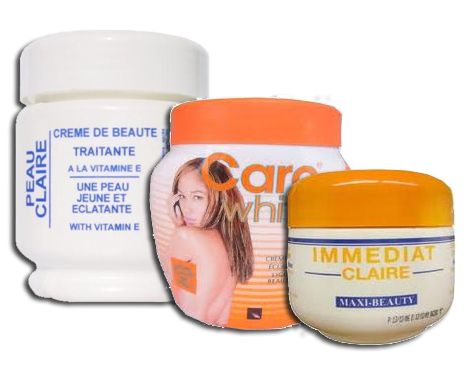Dear sisters, please! please! please! Learn to love the beautiful skin you’re in; dark, brown, light. Just own it! There’s nothing wrong in wanting to look your radiant best but use healthy and sustainable products or methods.
There is a big difference between seeking a glowing, healthy and even-toned skin and an unhealthy fixation on becoming light-skinned by using harmful skin products/chemicals. The former comes from a place of ‘wholeness’ while the often latter stems from a deep-seated sense of ‘insecurity’ and ‘unworthiness’.
Look around you and the signs are everywhere. You probably know a friend, aunty, sister, neighbor, colleague who is fixated on skin-bleaching.
For women of African descent, the scourge of skin bleaching is made worse because most women (and even men!) use creams made with the potent bleaching agent: Hydroquinone.
Some important facts about Hydroquinone:
1. Hydroquinone works by inhibiting the enzyme tyrosinase, which is important in skin pigment (melanin) development. It is important to be aware that Melanin actually provides protection against UV radiation. It is more effective than any sunscreen known to man. It diffuses UV radiation and turns it into harmless heat.
2. Combining Hydroquinone with skin products that contain benzoyl peroxide, hydrogen peroxide, or other peroxides, (found in most acne treatment) is harmful to the skin. This causes temporary staining of the skin. Also hydroquinone should not be used with any of the new resorcinol-based skin lightening treatments such as Clinique dark spot corrector.
3. 4% and above hydroquinone concentration is generally considered by most dermatologists to be one of the most effective skin-lightening and age spot-brightening agents. Overall, it is considered to be safer for Caucasians and light-skinned Asians BUT not as safe for African skin.

Are you a woman of African Descent? Here are 10 Reasons why Hydroquinone is bad for your skin:
1. It is harmful to your health! Although many European and American researchers argue that hydroquinone has NOT been directly linked to Cancer in humans only to mice. However, Hydroquinone clearly has a proven serious side-effect on humans as it causes pigmentation of the eye and permanent corneal damage. This only occurs when the eye is directly exposed to hydroquinone (So if you are still bent on using hydroquinone based products, avoid direct contact with the eyes).
2. It causes Ochronosis: For lighter-skinned women of colour (Indians, Chinese, Filipinos etc), dermatologists often recommend the use of hydroquinone in 3 to 4 months cycles and then alternated with less harmful lightening products. However, in darker skinned women (particularly of African descent), continued use of hydroquinone has been associated with ochronosis, which is a skin disorder characterized by progressive sooty darkening of the skin.
3. It whitens skin by killing your skin’s pigment cells. It also degenerates collagen and elastin fibres in the skin (Note: Collagen should be strengthened in order to have a youthful, smooth and glowing skin!)
4. Using Hydroquinone is counter-productive. It defeats the purpose
which you want it to achieve. You want glowing, radiant, healthy and brighter skin. The long-term use only leads to these horrible signs and effects: unseemly dark knuckles and ankles, unsightly purplish vericose veins, a patch-work of colours on once beautiful skin. Have a rethink!
5. It can cause irritation and contact dermatitis and increases the risk of other types of skin irritation and/or severe itching.
6. Even if you succeed in bleaching the skin whiter with hydroquinone products, it often has an unhealthy, pasty look. Also, once you stop using it, your skin re-darkens. And since using it long-term is unhealthy, it’s basically a catch-22 situation!
7. If you live in the tropical region, the combination of hydroquinone and the sun is a bad one. Increased risk of ochronosis have been linked to excess sun exposure while using hydroquinone. As such, dermatologists often recommend to always use hydroquinone with a sunscreen. (Note: In the hot African climate, sometimes, even sunscreens do not offer enough protection for the skin!)
8. Most products with hydroquinone have an awful smell and cause intense body heat and sweating. Users often try to mask the odour by profuse use of perfumes which seems to make it even worse. There is off-the-shelf hydroquinone-based product(s) that’s so potent that users have to constantly stay in air-conditioned rooms!
9. It thins out the outer layer of the skin (the epidermis), which is dangerous especially during or post- surgical procedures, as it may take the skin a longer time to heal from cuts, wounds and/or stitches.
10. It ages your skin and as you get older the effects become even more pronounced. It is not a pretty sight to see someone whose skin has been damaged by prolonged years of hydroquinone use! Age gracefully and not with disgrace. Love your skin today so that it keeps well and not fall apart tomorrow.
satisfashionug@gmail.com